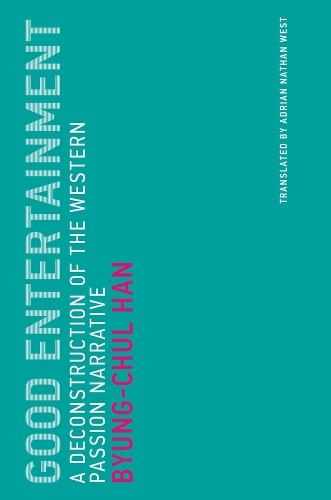
Good Entertainment: A Deconstruction of the Western Passion Narrative
(Paperback)
Publishing Details
Good Entertainment: A Deconstruction of the Western Passion Narrative
By (Author) Byung-Chul Han
Translated by Adrian Nathan West
MIT Press Ltd
MIT Press
8th October 2019
8th October 2019
United States
Classifications
General
Non Fiction
Society and culture: general
111.85
Physical Properties
Paperback
144
Width 114mm, Height 178mm, Spine 11mm
Description
A philosopher considers entertainment, in all its totalizing variety-infotainment, edutainment, servotainment-and traces the notion through Kant, Zen Buddhism, Heidegger, Kafka, and Rauschenberg.In Good Entertainment, Byung-Chul Han examines the notion of entertainment-its contemporary ubiquity, and its philosophical genealogy. Entertainment today, in all its totalizing variety, has an apparently infinite capacity for incorporation- infotainment, edutainment, servotainment, confrontainment. Entertainment is held up as a new paradigm, even a new credo for being-and yet, in the West, it has had inescapably negative connotations. Han traces Western ideas of entertainment, considering, among other things, the scandal that arose from the first performance of Bach's Saint Matthew's Passion (deemed too beautiful, not serious enough); Kant's idea of morality as duty and the entertainment value of moralistic literature; Heidegger's idea of the thinker as a man of pain; Kafka's hunger artist and the art of negativity, which takes pleasure in annihilation; and Robert Rauschenberg's refusal of the transcendent. The history of the West, Han tells us, is a passion narrative, and passion appears as a killjoy. Achievement is the new formula for passion, and play is subordinated to production, gamified. And yet, he argues, at their core, passion and entertainment are not entirely different. The pure meaninglessness of entertainment is adjacent to the pure meaning of passion. The fool's smile resembles the pain-racked visage of Homo doloris. In Good Entertainment, Han explores this paradox.
Author Bio
Byung-Chul Han, born in Seoul, is Professor of Philosophy and Cultural Studies at the Universit t der K nste Berlin (UdK). One of the most widely read philosophers in Europe, he is the author of more than twenty books, including including four previous volumes in the MIT Press Untimely Meditations series, In the Swarm- Digital Prospects, The Agony of Eros, Shanzhai- Deconstruction in Chinese, and Topology of Violence.
